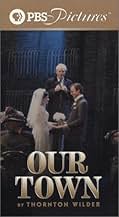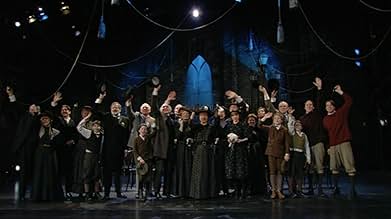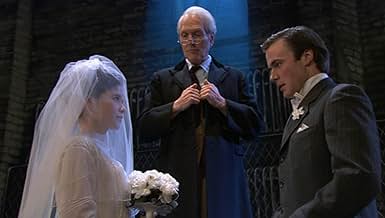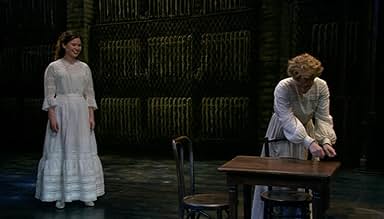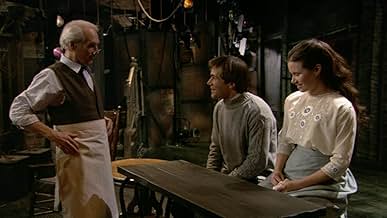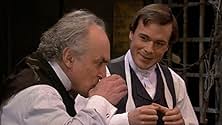Thornton Wilder's classic play on Grover's Corners, a fictional small town and its story taking place between 1901 and 1913, dealing with themes as life, death and the everyday routine of it... Read allThornton Wilder's classic play on Grover's Corners, a fictional small town and its story taking place between 1901 and 1913, dealing with themes as life, death and the everyday routine of its many residents, all followed and detailed by the Stage Manager.Thornton Wilder's classic play on Grover's Corners, a fictional small town and its story taking place between 1901 and 1913, dealing with themes as life, death and the everyday routine of its many residents, all followed and detailed by the Stage Manager.
- Nominated for 1 Primetime Emmy
- 6 nominations total
- Director
- Writer
- All cast & crew
- Production, box office & more at IMDbPro
Featured reviews
I also think Maggie Lacey is very fine as Emily. She plays the young woman as breathless, open-eyed, innocent, and just darn good. That is the way Emily is supposed to be played, of course, but Ms. Lacey does it exceptionally well. (How stupid it is to think that goodness is dull!) The actor who plays George (Ben Fox, I believe) is less appealing, and comes across at times as a near-hayseed. Fox is successful at playing George's self-doubts, but not his strength.
I have stayed away from the Hollywood version of the play, the one starring William Holden, because I have heard that the ending in the graveyard is changed, that it is treated as a dream. It's hard to believe that anyone would touch the text of Thornton Wilder's play, but a change of that magnitude would certainly take away much of the play's power.
All in all, this is a likable production.
(I'm trying to be cautious and not spoil the end. Is it possible to spoil it? Hasn't everyone who enjoys American stage already seen 'Our Town', like me, enough times they can almost speak the dialogue of that final scene along with the characters?)
The play is so familiar that the sparse set comes naturally. This production actually used an item or two that I don't recall from earlier ones, but it still seems right. I was much impressed by the lighting, pulling the action up out of the overall darkness. Some things worked less well, I thought. George and Emily aged, and this was harder to do when the camera could zoom in and show their faces. With no makeup changes, they were left with dialogue and voice to convince the viewer, as I didn't feel movements showed the aging effectively. The same applied to the two sets of parents. Nonetheless, when Emily held the stage in the last scene, she still made it one of the most moving moments in theater.
I am intrigued by the critical response to 'Our Town'. Early reviews seem to be enthusiastic, but some critics since seem to consider it too light, too trivial, to be listed among the great ones like Williams's and Miller's works. But aren't we talking here about the universal themes of life? Isn't that serious enough?
Find a copy of it if you can. It's one of Paul Newman's great moments.
Paul Newman? Yes, he's alright but lacks nearly any sort of personality. The lines that could provide him with sympathy or any form of engagement with the audience are delivered very dryly, with little if any humanity.
The casting? Strange, I think. Both of Emily's parents are quite a bit older than one would expect from a teenager. Gosh, in the 1899 flashback, her father looks like some dodgy 70 year old, and even Jane Curtin is too old to be a teenager's mother.
The script? I fail to see why the producer, director, &/or actors felt compelled to change the script. No, there no major changes, but why change at all? It is certainly not needed, and rather presumptuous.
Similarly, the cemetery scene in Act III is staged rather counter to Wilder's instructions. The dead in that scene seems more like they are waiting for a train than waiting for eternity, and more like a coffee klatch than dead. And they move about quite vigorously in their chairs. I expected a better adherence to Wilder's instructions.
And, when she first appears in Act III, Emily is rather blase. A better staging would be for Emily to show a bit of sorrow, a bit of loss, and a bit of wonder. Instead, it seems to me that Emily is just joining the queue for the train, which will be along any minute now. Just another day.
No, this staging is not bad, but I would have expected much much better from a professional production like this. This production is just mediocre.
Did you know
- TriviaIn this production Paul Newman played the stage manager. In the 1955 production which aired on Producers' Showcase (1954), Paul Newman played George Gibbs and Frank Sinatra played the stage manager.
- Quotes
Emily: Does anybody realize what life is while they're living it - every, every minute?
Stage Manager: No. Saints and poets, maybe. They do some.
- ConnectionsFeatured in Siskel & Ebert & the Movies: Bruce Almighty/The In-Laws/Our Town (2003)
Details
- Release date
- Country of origin
- Official site
- Language
- Filming locations
- Production companies
- See more company credits at IMDbPro


